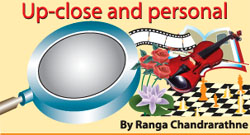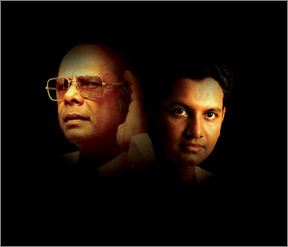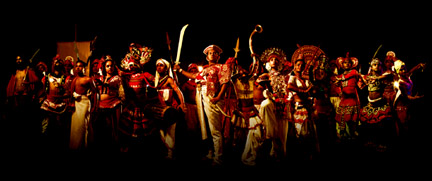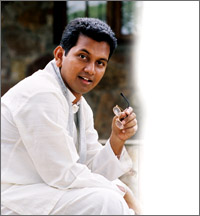Lionel Ranwala troupe and war on alienisms
A fascinating voyage into the forgotten territories
of rich folk heritage
 The latest concert of the Lionel Ranwala troupe 'Yuddhetath Evith' is
intended to attack the spreading alienisms and eroding of traditional
values of the country. This will be staged in a bid to instill
nationalism in the minds of the spectators. The latest concert of the Lionel Ranwala troupe 'Yuddhetath Evith' is
intended to attack the spreading alienisms and eroding of traditional
values of the country. This will be staged in a bid to instill
nationalism in the minds of the spectators.
According to Sahan Ranwala, 'Yuddhetath Evith' is a kind of 'cultural
war' on those who are against indigenous values and embraced alienisms.
The concert is organised by Lionel Ranwala Brigade which make up of
several organisations including 'Thalama Jathika Padanama', 'Senkadagala
Jana Gee Kandayama' and 'Matuparapura'. The members of the groups are
former students of the Ranwala troupe. The 'cultural war' will be
declared on May 7 and 8, 2007 at the BMICH.
 Lionel Ranwala troupe also conducts its regular concert 'Gama
Aulanggnag'. 'Yuddhetath Evith' is a concert aimed at achieving the
objective of the troupe. Referring to the successful foreign tours,
Sahan acknowledged the tremendous response that the concert 'Gama
Aulanggnag' received in Dubai where the non-Sri Lankans hailed the show
as one of the best Asian concerts they watched. Lionel Ranwala troupe also conducts its regular concert 'Gama
Aulanggnag'. 'Yuddhetath Evith' is a concert aimed at achieving the
objective of the troupe. Referring to the successful foreign tours,
Sahan acknowledged the tremendous response that the concert 'Gama
Aulanggnag' received in Dubai where the non-Sri Lankans hailed the show
as one of the best Asian concerts they watched.
Ebrahim, a professional lighting director praised the concert as the
best Asian concert he had seen in Dubai.
Referring to his father, Lionel Ranwala, Sahan said that his father
produced a cassette at the age of sixty after forty years of research
into Sri Lankan folk song and folk art.
Lionel Ranwala did not seek cheap publicity but wanted to popularize
Sri Lankan folk song. The prime objective of the Lionel Ranwala troupe
is to bring folk song into the mainstream realm of music and to compose
music based on traditional notations of folk music.
Since the death of maestro Lionel Ranwala, the troupe is striving
hard not only to preserve the work that the late maestro initiated but
also to carry out the much-needed research in folk music which is close
to the heart beat of the Nation and to make creations based on
researches.
 Lionel Ranwala troupe have so far used three main recording
facilities for their recording; Ranga Dassanayake's Hip Factory,
Jananath Warakagoda's J.W. Studio and Keerthi Pasquel's Sonic Studio. Lionel Ranwala troupe have so far used three main recording
facilities for their recording; Ranga Dassanayake's Hip Factory,
Jananath Warakagoda's J.W. Studio and Keerthi Pasquel's Sonic Studio.
The troupe has made use of the modern technology in perfect harmony
with the creations in a way that technology does not supersede the
creativity.
Acting on the clues for existence of original folk songs in some far
flung communities often untouched by the wave of urbanization and free
from the corrupting influence of ready-made pop-music, Ranwala troupe
dispatched a well-trained team of folk song gatherers or collectors.
The first task of the team is to be familiarizing with the villagers
and the community and then to ascertain whether the folk songs are
original. Thereafter the folk songs are recorded with their history of
origin and the specific communities they preserved. At some occasions
people are bit reluctant to part with the knowledge of 'Mantra' (spells
or charms that is part of black magic) in fear that they being abused
for worldly gains.
In this journey of discovery the troupe was able to unearth rare
forms of folk songs such as promotional folk songs composed during the
British rule when they promoted tea over coffee during the Tea
plantation drive and less popular "Media Vannama" (Frog ballad). This
ballad describes frog's cry that differs from season to season.
They also found out the original folk song 'Parata Kittuwa Delgaha
Mudune'. The folk song was originally sung by women Kurakkan reapers to
wild away the tiredness.
 However what we hear on the radio and TV was a distorted version of
the original folk song. The words of the original song were uprooted
from the original tune and incorporated into a fast moving melody,
rendering it a chaotic mishap. However what we hear on the radio and TV was a distorted version of
the original folk song. The words of the original song were uprooted
from the original tune and incorporated into a fast moving melody,
rendering it a chaotic mishap.
It has the debilitation effect of re-mixing 'Twinkle...Twinkle Little
Star' with a classical Indian Ragadhari melody. The original pieces of
music with the wording of the folk songs have been preserved and the
copies of audio and video have been presented to the National Archives
for public perusal.
Speaking on the concert 'Yuddhetath Evith', Sahan said that late
maestro's little know song on Sri Lankan traditional drums has been
included in the concert. The song was by lyrist by Jayatissa Boralugoda.
'Hele Manale Yak Kula Mage Kumari' is another song in the concert
which is a poignant song dedicated to a Yak girl (Yaksha, a tribe in
ancient Sri Lanka). This song is lyrist by Dhammika Hettiarachchi and is
the first of its kind.
A song consisting colloquial expressions of the outlying village of
'Panama' and another lyric describing 'Angampora', a Sri Lankan
traditional Martial Art have also been incorporated into the concert.
The salient feature of this concert is graphically display of the themes
depicted the lyrics.
Maestro Lionel Ranwala envisioned that the folk song should be
introduced to every segment of the society and song such as 'Herali
Rasai' which is sung in the calypso style by Jeewan Handunneththi, a
student of Lionel Ranwala, in his calypso group.
The song 'Nabara Re Sanda' is a result of a research where a minimum
number of music instruments is used for the song. The music for this
song is provided by two guitars and a percussion instrument. This was
especially designed for youngsters who can enjoy the music with a
guitar.
However, the objective of the research is to popularize the folk
songs and bring them into the mainstream music.
'Gama Aulanggnag' concert consists of original songs composed by
maestro Lionel Ranwala and 'Sansare Ma', 'Paramaruwenne Eyi Nangiye', 'Udara
Maubima', a song with patriotic sentiments with which the concert wraps
up. The original compositions by Lionel Ranwala are played and the
troupe performs to the tunes while folk songs are sung at the concert.
The concert is not only aimed at popularizing folk songs but also
convey the idea that people should show more concern about the history
and the future of the country. With this message, the Ranwala troupe had
so far conducted the concert in diverse parts of the country including
Vauniya and Omanthai.
Judging by the overwhelming response that the concert received
throughout the country, Sahan is of the view that Sri Lankan public
still appreciate folk song and love the nation.
Sahan received his primary education from Asoka Vidyalaya and then he
entered Ananda College where he developed a strong liking for aesthetic
subjects and folk song. He earned a BBA (Bachelor of Business
Administration) from the University of Colombo and had also successfully
completed a post graduate Diploma in Buddhist Studies from the
University of Kelaniya.
He also followed a post graduate Diploma in Journalism at the
University of Sri Jayewardenepura. Currently, Sahan follows a MA in
Drama and Theatre conducted at the University of Kelaniya. He is also a
final year student of the Law College.
****
Views on folk songs
"How should local and foreign musical systems be formed?"
"I admit that among the different musical systems practised in the
country, the kind of music, which could be considered as Sri Lankan, are
the Sri Lankan folk songs. But if some one tries to project these folk
songs not as a musical system, this is because of ignorance.
How could one classify a song with 5 or 6 musical tones, as one which
does not belong to any musical system?" - Ananda Samarakoon.
"Folk songs are the very foundation of this country's music said Ravi
Shanker when he visited Sri Lanka.
He said what he heard on his last visit to Sri Lanka ten years ago
were the songs mimicking the notations of Hindustan tradition and
compositions of Tagore, but the folk songs could be based to build a
true national musical system and it is the responsibility of a talented
musician to create a true national musical system." - Ravi Shanker
"There are four principle steps to be taken in order to create an
indigenous musical system.
* Preserve folk songs
* Analyse them
* Use this pattern of music for new creations
And to air programmes over radio and television - Prof. Joseph
Tunants (German Professor of music)
"The basic component of any developed musical system is folk music.
Western Countries use folk music to form their own systems of music. It
is an indisputable fact that in order to make a national musical system;
it is imperative to associate that music with folk songs and traditions
of that country" - John Talshow
"The traditional and folk tones have been used to create every
musical system as they contain the essence of the basic fundamentals." -
O. Ghoswami.
[email protected] |
